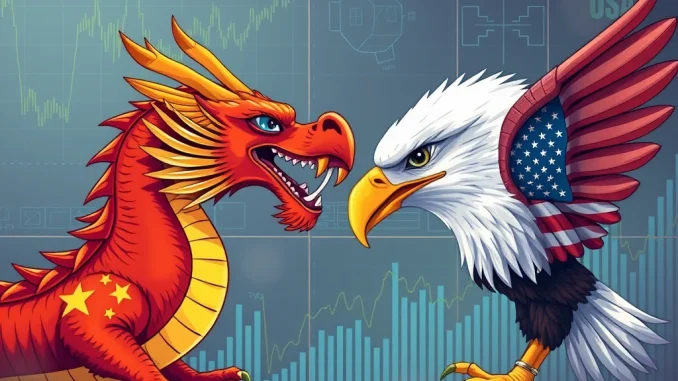
Is the global economy on edge? Recent reports suggest China is taking decisive steps to bolster its economic defenses amidst escalating trade tensions with the United States. Solid Intel, a prominent source on X, revealed that top Chinese officials are actively discussing accelerated measures to stabilize their economy and directly counter President Trump’s tariffs. But what does this mean for the world, and more importantly, for your investments in the volatile crypto market? Let’s dive deep into the unfolding situation.
Decoding China’s Economic Stimulus Strategy
China’s economy, a global powerhouse, is feeling the pressure. To combat this, Beijing is reportedly considering a ramp-up in economic stimulus measures. But what exactly does ‘stimulus’ entail in this context? Think of it as an economic injection, designed to boost growth and confidence. These measures could include:
- Increased Government Spending: Imagine massive infrastructure projects – new roads, railways, and technological advancements. This pumps money into the economy, creating jobs and stimulating demand.
- Monetary Policy Easing: This involves lowering interest rates, making it cheaper for businesses and individuals to borrow money. More borrowing means more investment and spending.
- Tax Cuts: Reducing the tax burden on businesses and individuals puts more money directly into their pockets, encouraging spending and investment.
- Support for Key Sectors: Targeted assistance to vital industries can prevent economic slowdowns and maintain stability.
These are powerful tools, and their expedited deployment signals the seriousness with which China is viewing the current economic climate. But will it be enough?
The Shadow of US Tariffs: Understanding the Impact
At the heart of China’s urgency lies the looming presence of US tariffs. These tariffs, essentially taxes on imported goods, are designed to make foreign products more expensive, thereby encouraging domestic consumption in the US. However, they have significant ripple effects:
- Increased Costs for Chinese Exporters: Tariffs directly impact Chinese businesses exporting to the US, making their goods less competitive.
- Supply Chain Disruptions: Global supply chains are intricately linked. Tariffs can disrupt these chains, leading to inefficiencies and increased costs across various industries.
- Potential for Retaliation: Trade disputes are rarely one-sided. China’s countermeasures are a direct response to these tariffs, potentially escalating trade tensions further.
- Impact on Consumer Prices: Ultimately, tariffs can lead to higher prices for consumers in both countries, as businesses pass on the increased costs.
The US-China trade relationship is a complex web, and tariffs are just one piece of the puzzle. Understanding their impact is crucial to grasping the current economic landscape.
Countermeasures and Global Trade Implications
China isn’t just absorbing the impact of tariffs; they are actively planning countermeasures. These actions are designed to protect their economic interests and send a clear message. Countermeasures could include:
- Reciprocal Tariffs: Imposing tariffs on US goods imported into China is a direct and often immediate response.
- Non-Tariff Barriers: These can include stricter regulations, inspections, or bureaucratic hurdles for US companies operating in China.
- Currency Devaluation: While a sensitive topic, allowing the Chinese Yuan to depreciate can make Chinese exports cheaper and more competitive.
- Strategic Resource Control: China’s dominance in certain critical resources could be leveraged in trade negotiations.
These countermeasures are not just about retaliation; they are strategic moves in a larger game of global trade power. The implications extend far beyond just the US and China, impacting economies worldwide.
Financial Stability in a Turbulent World
In times of economic uncertainty, financial stability becomes paramount. China’s expedited plans are a clear attempt to ensure stability within its borders and project an image of resilience to the global community. Why is this so crucial?
- Investor Confidence: Stable economies attract investment. Uncertainty and volatility can scare investors away, hindering growth.
- Market Sentiment: Financial markets react strongly to economic news. Stability helps maintain positive market sentiment and prevents panic selling.
- Currency Value: A stable economy supports a stable currency, which is vital for international trade and investment.
- Social Stability: Economic stability is often linked to social stability. Economic hardship can lead to unrest and uncertainty.
For crypto investors, broader financial stability is a key factor. While crypto markets are known for their volatility, they are also influenced by macroeconomic trends and global economic sentiment. A stable global economy can provide a more predictable and potentially positive environment for crypto assets.
Actionable Insights: What Does This Mean for You?
So, what should you, as a crypto enthusiast or investor, take away from this news?
- Stay Informed: Keep a close watch on global economic news, particularly developments in the US-China trade relationship. Reliable sources like Solid Intel can provide valuable insights.
- Diversify Your Portfolio: Economic uncertainty underscores the importance of diversification. Don’t put all your eggs in one basket, whether it’s crypto or traditional assets.
- Understand Macroeconomic Impacts: Recognize that macroeconomic events, like trade disputes and economic stimulus, can influence all markets, including crypto.
- Consider Safe Haven Assets: In times of volatility, some investors turn to assets perceived as ‘safe havens.’ While crypto’s safe haven status is debated, understanding this concept is important.
- Long-Term Perspective: Economic cycles are a natural part of the global economy. Maintain a long-term perspective and avoid making impulsive decisions based on short-term fluctuations.
The situation is dynamic and evolving. China’s proactive measures to stabilize its economy and respond to US tariffs are significant developments that warrant close attention. By staying informed and understanding the broader economic context, you can navigate the crypto landscape with greater awareness and make more informed investment decisions.
In Conclusion: Navigating the Economic Tides
China’s expedited plans are a clear signal that the global economic landscape is shifting. The interplay between China economy strategies, US tariffs, and global economic stimulus efforts will undoubtedly shape the future of global trade and financial stability. As these events unfold, remaining vigilant, adaptable, and informed is your best strategy to not just weather the storm, but potentially find opportunities within the changing tides of the global economy. The world watches closely as China navigates these complex challenges, and so should you.



